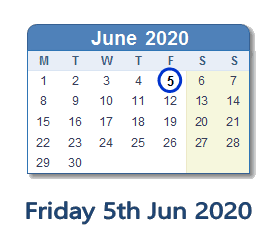5th JUNE 2020
DÍA MUNDIAL DEL MEDIO AMBIENTE
Hoy día 5 de junio se celebra el DÍA MUNDIAL DEL MEDIO AMBIENTE con la idea
y la necesidad de concienciar a las personas de cambiar ciertos hábitos y
acciones que están acabando con especies de animales, contaminando ríos, mares
y océanos y llenando de polución nuestras ciudades.
Por ello Happening ha
querido sumarse a la iniciativa y han creado la canción ES TIEMPO DE CAMBIAR
dirigiéndose a niños y adultos, colegios, asociaciones, familias...
Y, como dicen ellos “con
muchos pequeños gestos en el día a día conseguiremos grandes cambios para un
mundo mejor”.
"Únete a nuestro plan. El Planeta no puede
esperar”.
A Canadian television network is going to make a
report about Spain.
The crew of journalists has prepared a trip to our
country to collect information, record images, interview some people and prepare
the script.
Una cadena de televisión canadiense va a
realizar un reportaje sobre España.
El equipo de periodistas ha preparado un
viaje a nuestro país para recoger información, grabar imágenes, entrevistar a
algunas personas y preparar el guion.
1. The television crew wants to know exactly the location and limits of
Spain and its territorial organization. Help them by writing a review to
explain these to them.
1. El equipo de
televisión quiere saber exactamente la localización y los límites de España y
su organización territorial. Ayúdales escribiendo una reseña para explicárselo.
2. Could you clear up them the following information?
The Constitution is the most important law of Spain and it establishes that
Spain is a "social democratic state of law"
2. ¿Podrías aclararles
la siguiente información?
La Constitución es la
ley más importante de España y en ella se establece que España es un “Estado
social y democrático de derecho”
3. What is the official language of Spain? What other languages are
official ones too?
3. ¿Cuál es la lengua
oficial de España? ¿Qué otras lenguas son también oficiales?
4. In addition, they have taken these notes about
Spain, but some mistakes have been overlooked. Cross out the statements that
are not correct. And correct them.
- Spain is a parliamentary monarchy.
- The main institutions of Spain are: the Mayor, the Parliament, the National Government, the Courts of Municipalities and the Constitutional Court.
- The Head of State is in charge of running and ruling the country.
- The monarchy is hereditary.
- The members of the Spanish Parliament are elected every six years by Spanish citizens over 18 years old.
- The Courts of Justice run the State.
- The President of the Government and the ministers establish the laws and pass budgets.
- The Parliament is made up of the Congress of Deputies and the Senate.
- The ministers are proposed by the President and named by the King.
- There is a Constitutional Court to enforce the Constitution, the most important law.
4. Además, han tomado estas notas sobre España, pero
se les han colado algunos errores. Tacha las
afirmaciones que no son correctas. Y corrígelas.
- España es una monarquía parlamentaria.
- Las principales instituciones de España son el alcalde, las Cortes Generales, el Gobierno, los tribunales de los municipios y el tribunal Constitucional.
- El jefe del Estado se encarga de dirigir y gobernar el Estado.
- La monarquía es hereditaria.
- Los miembros de las Cortes Generales son elegidos cada seis años por los ciudadanos españoles mayores de 18 años.
- A los tribunales de justicia les corresponde dirigir el Estado.
- El presidente del Gobierno y los ministros elaboran las leyes y aprueban los presupuestos.
- Las Cortes Generales están constituidas por el Congreso de los Diputados y el Senado.
- Los ministros son nombrados por el Presidente del Gobierno a propuesta del rey.
- Existe un Tribunal Constitucional para interpretar la Constitución, que es la ley más importante.
5. The television crew wants to interview a commissioner, a Eurodeputy and a
minister of the EU. Say to which institution they have to talk to and their
functions.
Position
|
European Institution
|
It’s in charge of…
|
Commissioner
|
||
Eurodeputy
|
||
Minister
|
5. El equipo de televisión quiere
entrevistar a un comisario, un eurodiputado y un ministro de la UE. Di a qué
institución debe dirigirse en cada caso y de qué se ocupa cada uno de ellos.
Cargo
|
Institución europea
|
Se ocupa de…
|
Comisario
|
||
Eurodiputado
|
||
Ministro
|
6. In the report they want to include a presentation of each member country
of the EU. How many presentations they have to make?
6. En el reportaje van a incluir una
presentación de cada uno de los países miembros de la UE. ¿Cuántas
presentaciones tendrán que realizar?
7. They are thinking about mentioning these two dates in the report. Why are
they important for the EU?
1957 1992
7. Han pensado mencionar estas dos fechas
en el reportaje. ¿Por qué son importantes para la UE?
1957 1992
8. The journalists have some doubts about the difference between the Common
Market and the Eurozone. Help them to solve them.
8. Los periodistas tienen alguna duda
acerca de la diferencia entre el mercado común y la eurozona. Ayúdalos a
resolverla.
FECHA DE ENTREGA: 10 DE JUNIO
- CLASE EN TEAMS.
- MATERIALES: Class Book & Activity Book, cuaderno, bolis, lápiz,...








Comentarios
Publicar un comentario